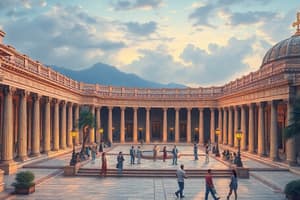Podcast
Questions and Answers
Who is responsible for making and carrying out laws in a parliamentary democracy?
Who is responsible for making and carrying out laws in a parliamentary democracy?
- Head of State
- Executive Branch
- Judicial Branch
- Legislative Branch (correct)
How is the leader of a parliamentary system typically chosen?
How is the leader of a parliamentary system typically chosen?
- By the military
- Through a national vote
- Inherit the position
- By the political party with the most representatives (correct)
What defines an absolute monarchy?
What defines an absolute monarchy?
- A government led by a prime minister
- A government elected by citizens
- A government with a constitution limiting powers
- A government with a king who has absolute power (correct)
What type of democracy features a separation of powers between branches of government?
What type of democracy features a separation of powers between branches of government?
In which country do citizens have limited influence over the government?
In which country do citizens have limited influence over the government?
What is the Knesset?
What is the Knesset?
Who has the ceremonial role in a parliamentary democracy?
Who has the ceremonial role in a parliamentary democracy?
Voting rights in Israel may be limited based on what criteria?
Voting rights in Israel may be limited based on what criteria?
Study Notes
Forms of Government
- Autocracy: A single ruler holds absolute power, making all important governmental decisions.
- Parliamentary Democracy: The legislative branch holds the power to create and execute laws.
- Presidential Democracy: The executive branch, headed by a president elected by citizens, has separate powers from the legislature.
- Absolute Monarchy: A king or queen holds absolute power, with no limitations.
Political Systems in Southwest Asia
- Israel:
- Parliamentary Democracy: Governed by an elected legislature (the Knesset) and a prime minister.
- Voting Rights: Citizens aged 18 and older can vote.
- Limited Voting Rights: Some restrictions based on religion or ethnicity.
- Saudi Arabia:
- Absolute Monarchy: The king holds absolute power.
- Citizens' Role: Limited influence in government decision-making.
- Religion: Citizens must practice Islam.
- Sharia Law: Islamic Law forms the legal system.
- Turkey:
- Presidential Democracy: The president, elected by citizens, holds the executive power.
- Parliament: The Grand National Assembly (legislature).
- Limited Rights: Government limits the rights of women and Kurds.
Studying That Suits You
Use AI to generate personalized quizzes and flashcards to suit your learning preferences.
Description
Explore the different forms of government including autocracy, democracy, and monarchy. Additionally, delve into specific political systems of Southwest Asia, focusing on Israel and Saudi Arabia. Understand the roles of citizens and the influence of religion in governance.




